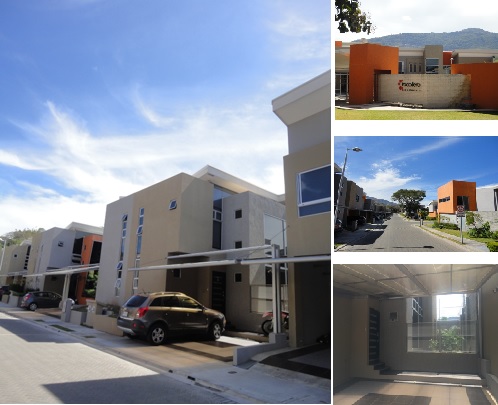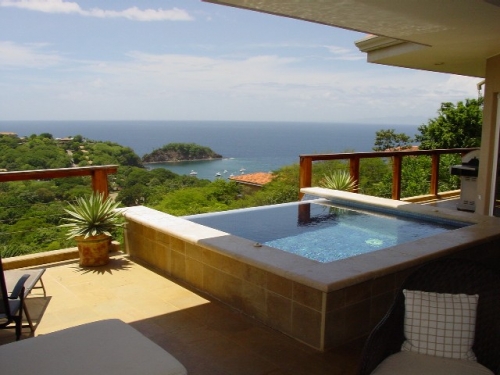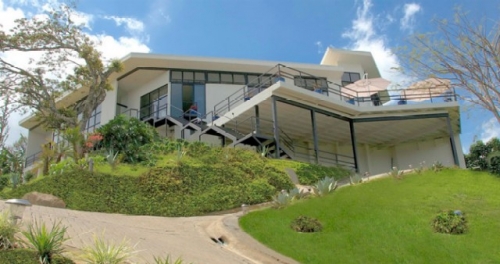Costa Rica Guide
Costa Rica Real Estate
List your property today!
Inclusion of real estate listings at Costa Rica Guide is
absolutely free of charge.
Featured Properties
Costa Rica Guide - Costa Rica Real Estate
Buying Process - Real Estate Information
Legal Tips, Tricks, and Traps in Costa Rican Real Estate
By Thomas A. Burke-Maessen, Attorney at Law
In this article I offer a few pointers for our readers considering purchasing a residential, Business, or rural property in Costa Rica.
First let's review the answer to that basic question on land ownership. Yes, a foreigner can purchase real estate on pare with nationals, except for some shoreline property, which can be leased from the state by national or majority national-held corporations and then only in accordance with the specific regulatory plan for the particular area. In all respects, foreigners enjoy the same degree of constitutional and legal protection as Costa Rican citizens. The principle of private property is a basic tenet of the Costa Rican legal and economic system, as well as the culture itself. This means that to acquire of hold property rights in Costa Rica one need not be a citizen, a legal resident, or even physically present. And now, on to some specifics.
Conventional wisdom when purchasing a substantial residence has often been to form a corporation to hold the residence. This supposedly separates liability, avoids probate and saves taxes on subsequent transfers of the property. There are several problems with this and, I believe better solutions. One must take into account that corporations are theoretically businesses: therefore, they are potential taxpayers and are subject to filing requirements and so on. Owning a corporation may also unnecessarily complicate tax filing in the home country and, therefore, should not be used carelessly.
If purchasing a home for personal use it is probably more advantageous to place it under the "homestead" protection provided for family homes in the Costa Rican Family Code. This protects the property from all liens except those arising out of liability stemming directly from the property itself, such as mortgages or property taxes.
Even in terms of avoiding complicated inheritance situations, it is usually best to draft a Costa Rican will to make provisions for handling a local residence in the event of the owner's passing away. A simple and properly formalized will guarantees a smooth and fairly rapid court procedure for transferring such property to an heir(s). If one desires nonetheless to avoid the court procedures entirely, and use a corporation as a holding company for the property, it is absolutely necessary to ensure that the heir(s) hold a majority of the stock or have registered powers of attorney allowing them to dispose of the property. Unless this is done, the heir(s) would again be subjected to court procedures (which in the absence of a proper will could be difficult) in order to claim the company shares and/or have to register powers of attorney after holding a stockholders' meeting to that effect, plus other attendant notarial formalities.
Finally, in terms of avoiding property transfer taxes by transferring the stock of the company holding a property, I see little purpose, since a careful attorney will advise a purchaser to transfer a property out of the corporation and pay the transfer taxes rather than risk taking on any liabilities not reflected on the company books. Generally, I only advise forming a business corporation for properties meant to be exploited in a business enterprise, and then only when truly legally necessary.
Before purchasing a property for a business venture, do consider that according to the Costa Rican Code of Commerce a foreigner cannot carry out business in his own name unless he or she has accumulated at least ten years of legal residency. The foreigner may, however, carry out business through a Costa Rican corporation, which he may wholly won and fully represent. This is so because a Costa Rican corporation that is formed and registered in Costa Rica is by definition a Costa Rican legal entity and specifically created for organizing business ventures here. Yet certain business areas, most notably the mass media, advertising, banking, and shoreline tourist projects have severe restrictions on foreign owned corporations. Each of these examples requires very careful research with qualified consultants before committing to a corresponding real estate transaction.
It is also worth mentioning that mortgages in foreign currency have recently been allowed by a Constitutional Court decision; however, the debtor always retains by law the right to pay in local currency at the current real value of the foreign currency specified in the mortgage. This applies unless the debt is registered as originating in foreign commercial financing.
Concerning rural properties, the U.S. Consulate advises purchasing a rural property only when you plan to live on it not for purely speculative purposes. This is because Costa Rica takes a generally peaceful approach to the not uncommon squatter problems that usually involve absentee-owned properties. The law actually provides for mandatory government expropriations for land disputes when squatters have put the property to agricultural production for at least a year. The problem lies with getting prompt and effective payment for expropriations and, to make a long story short, Costa Rica has a poor reputation in this regard. Along the same lines, another type of land holding problem occurs when neighbors take advantage of the absence of the owner by, for example, changing a fence line and encroaching on an unwatched property, gradually taking possession of significant portions. The legal remedies are almost always more costly in terms of money, time, and aggravation than would be making good security and maintenance arrangements to begin with.
Due to the fact that roughly a quarter of the national territory is included in national parks, forest reserves, wildlife protection areas, and similar such categories, it is wise when considering purchasing a rural property to check maps showing where these areas lie. Although it is best to have an experienced attorney double-check for you, good topographical maps and aerial photographs are available from the National Institute of Geography. These can be either matched with commercially sold maps showing protected areas or taken to the Ministry of Natural Resources for more precise comparisons.
That's all on the tips and the traps for now. The trick is to use common sense, good research, and, of course, competent professional advice.
About the author: Thomas A. Burke is a member of the Costa Rican Bar Association, with years of experience in business administration and investment consulting in Costa Rica. He speaks fluent English, Spanish, German and French.
Please contact the author to obtain professional Costa Rica real estate legal advice.
Copyright 1996-2004
Note: The above information is not to be used for any other purpose other than private study, research, criticism or review. Thank you.






